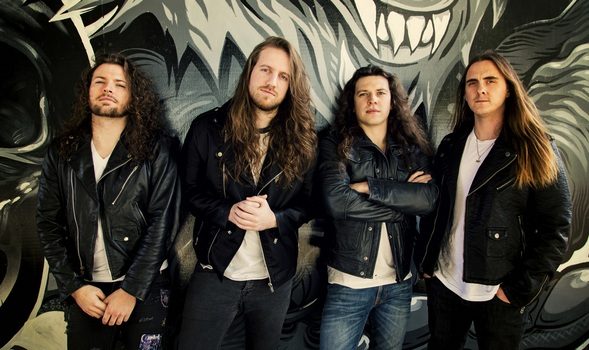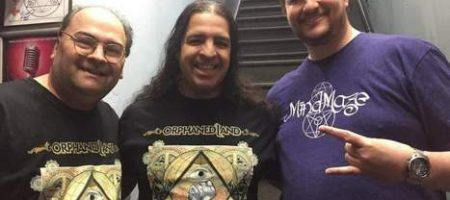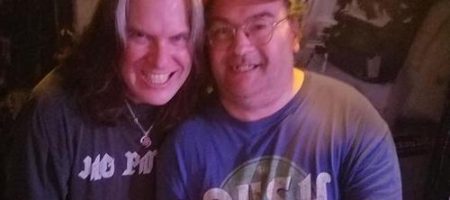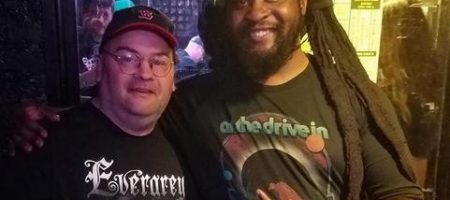Striker – Northern Road Warriors
Monday, 2nd October 2017
Heavy metal in its purist form comes down to certain root elements. If looking back at the classic template, driving twin guitars, a tight, propulsive rhythm section, and a powerful vocalist that can belt out varying melodies and screams are mainstays. When wondering who is going to carry the torch laid out from Judas Priest, Iron Maiden, Accept, and so forth – at least in the past decade, Edmonton, Canada’s Striker deserve major attention for the quality hooks and sterling songwriting put forth on their fifth full-length records to date.
Their latest self-titled record released earlier this year captures all facets of their love for heavy metal – power, thrash, and melodic aspects are all taken to account, along with a band that can deliver four-part vocal harmonies when called for in the key choruses. Consistent road warriors in a day and age where that’s the main proving ground to build a wider following, we caught up with one of the band’s guitarists Tim Brown after soundcheck during the second week of their North American tour as openers for Dark Tranquillity and Warbringer outside The Chance Theater in Poughkeepsie, NY.
We catch up on everything from hurricanes to their impressive speed when it comes to releasing records, music education in Europe versus America and Canada, as well as what they’ve learned becoming road warriors over the past few years – as Striker remains committed to delivering their all for the fans.
Dead Rhetoric: You ended up traveling 44 hours to get to the first date of this tour from Edmonton to Florida, playing one day before you had to worry about Hurricane Irma. What exactly happened, how did you pass the time and were you worried about the hurricane?
Tim Brown: Up in Edmonton, there’s no hurricanes- so it was definitely a new experience for us. We have blizzards and tornados, but no hurricanes. We drove straight from Edmonton to Chicago, slept there, headed to Nashville from there, and then basically Pensacola, Florida. It took about 50 hours, that was one hell of a drive. We listened to a lot of music, we have a laptop to watch movies. You go a little crazy, but what can you do? It’s par for the course.
Dead Rhetoric: Now this is what, a week at this point into the tour with Dark Tranquillity?
Brown: According to my tour lanyard, this is date nine- but three had to be cancelled and we also played a warm-up show in Panama City, without Dark Tranquillity or Warbringer.
Dead Rhetoric: What do you think of this tour package? It seems to me one of the more diverse packages as far as having everything from melodic death metal and thrash to the classic metal and power/thrash nuances?
Brown: Yeah, it’s been a lot of fun. Meeting all these guys- I’ve seen Warbringer a few times before, I’ve never seen Dark Tranquillity before. It’s cool to meet the guys, hang out, everyone is really cool. We are having a good time, the fans seem to be having a lot of fun, and that’s the most important thing.
Dead Rhetoric: Is speed and consistency an important attribute to Striker’s impact on the scene- because you’ve been able to put out three albums in the past four years?
Brown: Yes. One thing that I always like to talk about is we are in a band because we like to make music. That’s why we do it- one of the things that we all do when we are at home is play guitar. It would be weird for us to not be putting out music, especially now that we are independent and on our own label, we can do whatever the hell we want. If we have 40 minutes of good sounding music, we might as well put it out.
Dead Rhetoric: Do you end up working on material in between soundchecks and downtime, or do you need that separate time away from the road to write?
Brown: Writing on the road, at least for us on this level, is not possible. Generally speaking, you need to be on your own tour bus to write on the road. I can see us making riffs- at least for us, when we are not playing, we are driving and outside of those two things, we are probably sleeping. It’s pretty jam packed when we are on tour, so all the writing takes place at home.
Dead Rhetoric: How is stress and conflict handled within the band, either on the road or in terms of business decisions?
Brown: We just drink a lot! (laughs). We are pretty conflict free, for the most part. We are all really good friends, we’ve known each other forever. Adam is my brother, so I’ve known him forever, and some of the other guys we’ve been playing together in bands for years before Striker. Hanging out and partying for 15-20 years.
Dead Rhetoric: Do you and Adam come from a musical family?
Brown: All of our parents have been semi-involved in some sort of music at some point in their lives. No one’s parent was like Gene Simmons or anything. My dad was in a local bar band, Dan’s parents were in a church choir, stuff like that.
Dead Rhetoric: Many bands in recent interviews that I’ve done when they tour with your band discuss the professionalism when it comes to your live performances. What learning curves and tips have you developed to strengthen the Striker attack on the live front?
Brown: We always try to keep an open mind and we are always trying to improve on things. Especially now that we’ve been doing so many tours in the last couple of years. You get a lot of time to really get to work on your live set, as a group as well as individually. You always pick up something, you go on tour and see a band that does something really cool, you decide to do that- steal it. It’s kind of what we do.
Dead Rhetoric: Where do you see the major differences in the metal scene across Europe in comparison to North America, now that you’ve toured both markets extensively?
Brown: I’ve always noticed that Europe seems to be a metal scene having more of a mainstream appeal, music with people playing actual instruments instead of a deejay pushing play on an iMac or something. To me it seems like there’s more of an appreciation for musical education, it’s also in the curriculum at schools. Here in the states, it’s not always in there as much. I didn’t go to school here, but from what I’ve heard it’s this way. Whereas in Europe, there is a lot of training available.
Dead Rhetoric: Did you have that chance at music in school in Canada?
Brown: It depends on what school you go to. The elementary schools that I went to, ended up becoming an art in school. I was always in music classes in high school, same with the rest of us. It warms the brain up for heavy metal, when you are young and impressionable.
Dead Rhetoric: What are your earliest memories surrounding heavy metal during your childhood?
Brown: I started getting into heavy metal when I was in high school. I remember on the radio the only songs they would play was Metallica- “Enter Sandman” and their cover of “Whiskey in the Jar” – and I didn’t really like those songs. I thought Metallica sucked, someone asked me to check out their early stuff, and I said ‘no- I hate Metallica’. I put it on, and it was so much better- it was basically from there on. If that was cool, it was time to check out some other bands.
Dead Rhetoric: How did the idea of covering “Desire” from Ozzy Osbourne’s No More Tears album come up for the latest Striker album?
Brown: We were just having some drinks, we needed some cover tracks, so we decided, ‘hey- how about this one?’. Not too much thought- just a little bit of beer. We really like that album, that’s still classic Ozzy stuff to us.
Dead Rhetoric: What have been some of your favorite covers through the years – I love the Grim Reaper song “You’ll Wish That You Were Never Born” from the Road Warrior EP…?
Brown: Yeah, that’s a good one. We’ve done lots of different covers for shows and stuff too. It’s hard to pick one, I’ve always played in tribute bands back home for Metallica, Pantera, so I always consider that fun.
Dead Rhetoric: You’ve developed many entertaining videos for Striker over your career. Can you discuss your thoughts on the importance of this medium, does it convey more of the band’s attitude and personalities?
Brown: Videos are pretty important these days, there’s so much- you turn your computer on, there’s images as well as sound. You need to be on both fronts, you have to look good and sound good. That was all about the 1980’s and MTV, but it’s important now with social media because you need new pictures every day. We’ve also found that a lot of people have said that they’ve found us on YouTube – that’s how they discovered us. YouTube has been really great for us, and we hope that more people end up checking out our music videos. We just premiered a new video for “Former Glory” about two weeks ago, at the start of this tour.
Dead Rhetoric: What do you think of the concept for this new video, there’s a lot of special effects in there?
Brown: We’ve never done anything like that before. Performance videos seem to be the kind of way to go- we are always looking for a different spin on a performance video. Dan Cleary our singer was the director – he’s our multi-media specialist.
Dead Rhetoric: Speaking of videos, I saw something on your Facebook page where you had a discussion about Manowar- how did that come about?
Brown: (laughs). I don’t know, we have a bunch of friends and some of them love Manowar and some of them hate Manowar. We just decided to throw that up there.
Dead Rhetoric: Assembling material, you mentioned that you record riffs on your phone – do you hope to be working on that as soon as you get off tour?
Brown: Usually what we do, we can make demos and stuff at home. When we go on tour, we will listen to these demos in the van and pick out the songs that we like. It’s usually pretty easy to tell which ones are hit or miss. And then after one or two tours, we have enough material for a new album, we let them rip.
Dead Rhetoric: Do you find yourselves being more critical with five albums under your belt for what makes a Striker song?
Brown: I think so. We’ve been doing this for so long, I remember just before we left for this tour, we had some demos and doing some vocals, and remember thinking ‘why is this so hard?’. It took me days to do these tracks- and listening back to these other tracks, it’s not because I’m getting worse, it’s because I have a more critical ear for things like being out of tune, I should fix that.
Dead Rhetoric: Do you have a game plan when it comes to your social media posts, and is it a challenge to market to so many different populations because of the platforms in play?
Brown: We do our best for social media. We are an independent band, so we have to do everything ourselves. We do our best, definitely different kinds of people use different things on social media. For example, I don’t think Facebook or Instagram are that popular in China or Japan at all, they have their own social media things that we are not even on. We’ve also noticed different people are on different sites, in Europe everyone uses Facebook, but some people use it more than others.
Dead Rhetoric: How do you feel about the streaming services for music, it’s obviously changed the game for music consumption, especially for younger generations?
Brown: You can’t get rid of streaming now, so you either live with it or you die. You have to just learn to live with it, the industry will change to accommodate to it.
Dead Rhetoric: What are areas that maybe younger, unsigned bands place too much emphasis on, and where would their best efforts be served in terms of budgeting or time?
Brown: I think the most important thing is to make sure that you have good songs. Nowadays it’s so easy to send your stuff out to get mixed and mastered properly, to anywhere in the world, any studio will take you on if you have the money for it. Just look through your record collection to find a producer that you really like, and send your stuff to them. They’ll make you sound good – and any band can get on iTunes and Spotify. What will separate you from the rest of the bands is having good material. I think that’s the biggest thing.
Dead Rhetoric: Your last two European tours, you ended up playing bigger venues opening for bands like Primal Fear and Sonata Arctica. How did these tours go, and will this make a stronger impact for the band to headline?
Brown: I hope so- we haven’t really done a headlining show over in Europe for a couple of years now. We are trying to plan out a headlining tour over there early next year, so we’ll see how that goes. We made a lot of fans over our last couple of tours there- I hope they come out.
Dead Rhetoric: Have you ever had any wild weather-related incidents outside of this hurricane on the road?
Brown: Nope, fortunately the worst was Irma. Gas was sold out, water was sold out- fortunately we are in a diesel vehicle, and that wasn’t sold out. It was crazy – the highways were backed up for miles. A four-hour drive ended up taking us eight hours.
Dead Rhetoric: What does the next six to twelve months look like for Striker?
Brown: We are going to be recording a new album in January 2018 back in Studio Fredman in Sweden, where we’ve done our last three albums. We have the studio time booked, we hope to have the new album out in the spring. Who knows exactly. We are trying to do more touring in Europe and some more tours here in North America, hopefully we can bring the shred everywhere that we can.




























